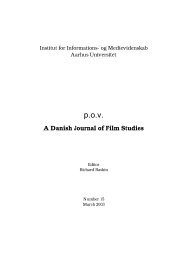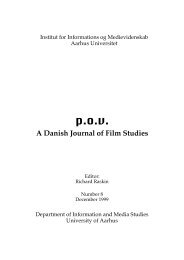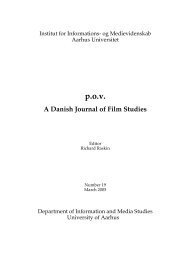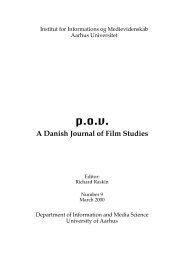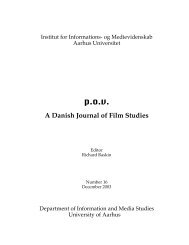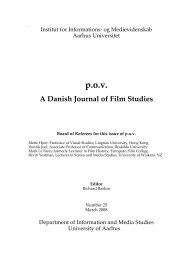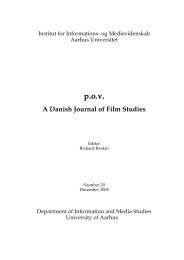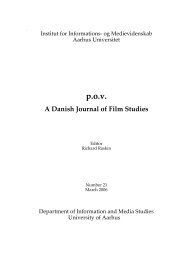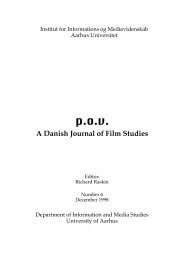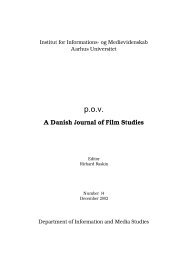The Face of Time - POV - Aarhus Universitet
The Face of Time - POV - Aarhus Universitet
The Face of Time - POV - Aarhus Universitet
Create successful ePaper yourself
Turn your PDF publications into a flip-book with our unique Google optimized e-Paper software.
118 p.o.v. number 13 March 2002<br />
addressed directly "with titles or voices that advance an argument<br />
about the historical world," and <strong>of</strong>ten images merely become<br />
illustrations <strong>of</strong> what the authoritative commentary (voice <strong>of</strong> God)<br />
maintains. A logical connection between sequences is predominant.<br />
2) <strong>The</strong> Observational Mode: <strong>The</strong> camera acts as 'a fly on the wall,'<br />
style and mise-en-scène become invisible and in its purest form<br />
inter-titles, interview and voice-over commentary are excluded; the<br />
filmmaker is unobtrusive and the viewer is left to interpret reality<br />
for himself. 3) <strong>The</strong> Interactive Mode: Different kinds <strong>of</strong> dialogue and<br />
monologue are dominant. Most <strong>of</strong>ten these films are based on<br />
interviews. Although the filmmaker participates (e.g. in the role <strong>of</strong><br />
'provocateur'), the textual authority in this mode shifts towards the<br />
"social actors" (the authentic people) so that "their comments and<br />
responses provide a central part <strong>of</strong> the film's argument" (p. 44). 4)<br />
<strong>The</strong> Reflexive Mode: This renders visible the epistemological and<br />
aesthetic reflections that are the basis for the production, thus<br />
drawing attention to the process <strong>of</strong> filmmaking. It makes use <strong>of</strong><br />
various kinds <strong>of</strong> Verfremdungseffekt and generally questions how a<br />
representation can "be adequate to that which it represents" (p. 57).<br />
(Nichols, who focuses on the documentary as a form <strong>of</strong> rhetoric,<br />
clearly lacks a fifth modus, namely the poetic in which an aesthetic<br />
approach to a given subject is predominant. <strong>The</strong> poetic representation<br />
focuses on experiencing the world, not on the objective<br />
representation <strong>of</strong> it; it attempts to perceive the world aesthetically,<br />
and is <strong>of</strong>ten emotional in a poetic way. Remember that a documentary<br />
can speak with many 'voices.'<br />
<br />
If your film contains an interview session it is important that you<br />
experiment with different interview techniques before you start



